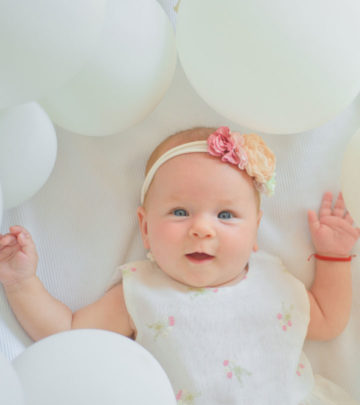
Image: Shutterstock
Picking a name for your baby is always exciting, and naming your baby calls for a celebration. Be it ten days after their birth or a month later, having a little party for their naming ceremony is a standard practice around the world. Did you know that there are still many countries that retain their traditional ceremonies for naming babies? If you are looking for inspiration, or just curious about some unique features included in naming celebrations, here are a few countries to learn from. Each country on our list has traditions that are exclusive to their culture and traditions. How beautiful is that! So if you are looking for ideas, you might want to look at how baby naming ceremonies are celebrated in these exotic locations. Read on!
1. Iceland
Image: Shutterstock
Icelanders do not have family names, so different generations belonging to the same family can have completely different names! Last names are typically based on the father’s first name adding “son” to it if you have a son, or “dottir” if you have a daughter. And did you know that they have a list of names you should choose from? That’s right, you can’t just name your child something outrageous like say, Wolf in Iceland, the country has a Personal Names Register which includes all names approved by the Iceland Naming Committee. If you have a specific name in mind that isn’t on the register, parents must pay a fee to get it approved. So, would you want to have your baby in Iceland?
2. Ghana
Image: Shutterstock
In Ghana, babies are named in an official ceremony that takes place mere days after their birth and it is a HUGE DEAL! All relatives and close friends are expected to attend as this is usually the first time loved ones and extended family get a glimpse of the baby. The baby is named by the father and other elders in the house based on the child’s birth and characteristics. The baby’s first name is also based on the day they were born and their second name can be borrowed from an older family member.
3. Bali
Image: Shutterstock
In Bali, it is common to name your babies in the order of their birth. That’s right, there are certain names reserved for each place. If you are a first born, names like Nengah, Gede, Wayan, Putu, and Ni Luh are reserved for boys. For second born names like Nengah, Kadek, Made, and Ngurah are usually used. Third children are usually called Komang or Nyoman whereas babies born fourth can be named Ketut and fifth children are often named Wayan Balik. Therefore, names for babies born much later are rarer as there are fewer fourth and fifth children around.
4. Ireland
Image: Shutterstock
Babies in Ireland are often named after paternal and maternal relatives like a favorite aunt, the grandparents, the sister, or a very prominent family figure. This is usually considered for the baby’s middle name. Another common tradition is naming your child after a saint if they are born on a saint’s day. So, for example, if your baby is born on St.Patrick’s Day, your baby will be named Patrick.
5. Greece
Image: Shutterstock
In Greece, there is a long-lasting tradition of naming your child after the grandparents. Sometimes the parents might even combine the names of both paternal and maternal grandparents to make a new, unique one. For example, Marri and Anna will become Marianna. However, in recent years, parents have opted to reserve this name for their baby’s middle name. Baby names are also influenced by those of saints and the Greek Orthodox Church. Babies who are named after a specific saint also celebrate the saint day of the saint they take after. This saint day or name day can also double as a birthday.
6. Spain
Image: Shutterstock
It is common in Spanish culture to have one or two names. These names are usually traditional Biblical names, taken from the Bible. Like those in other Christian countries, they also opt to name their babies after saints, priests, or martyrs. In recent times however, more and more parents are gravitating towards more modern names with international appeal. For surnames, Spanish culture combines both paternal and maternal surnames as women generally do not change their surname after marriage. This means that babies usually have two last names, one from each parent.
Choosing and celebrating your baby’s name can bring great joy to the family. And people from different cultures do this in different ways. Would you like to inculcate any of these naming traditions into your baby’s naming day? Let us know in the comments section!



















